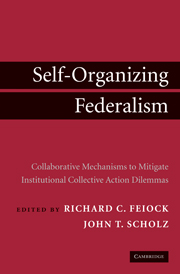 Self-Organizing Federalism
Self-Organizing Federalism Book contents
- Frontmatter
- Contents
- List of Figures
- List of Tables
- Contributors
- Preface
- PART ONE SELF-ORGANIZING VERSUS CENTRALIZED SOLUTIONS TO INSTITUTIONAL COLLECTIVE ACTION PROBLEMS: THEORETICAL CONSIDERATIONS
- PART TWO INTEGRATING METROPOLITAN SERVICE PROVISION: NETWORKS, CONTRACTS, AGREEMENTS, AND SPECIAL DISTRICTS
- PART THREE INTEGRATING REGIONAL POLICIES THROUGH NETWORKS, JOINT VENTURES, AND PARTNERSHIPS
- PART FOUR SELF-ORGANIZING GOVERNANCE AND INSTITUTIONAL COLLECTIVE ACTION
- 13 Self-Organizing Mechanisms for Mitigating Institutional Collective Action Dilemmas: An Assessment and Research Agenda
- References
- Index
13 - Self-Organizing Mechanisms for Mitigating Institutional Collective Action Dilemmas: An Assessment and Research Agenda
from PART FOUR - SELF-ORGANIZING GOVERNANCE AND INSTITUTIONAL COLLECTIVE ACTION
Published online by Cambridge University Press: 29 January 2010
- Frontmatter
- Contents
- List of Figures
- List of Tables
- Contributors
- Preface
- PART ONE SELF-ORGANIZING VERSUS CENTRALIZED SOLUTIONS TO INSTITUTIONAL COLLECTIVE ACTION PROBLEMS: THEORETICAL CONSIDERATIONS
- PART TWO INTEGRATING METROPOLITAN SERVICE PROVISION: NETWORKS, CONTRACTS, AGREEMENTS, AND SPECIAL DISTRICTS
- PART THREE INTEGRATING REGIONAL POLICIES THROUGH NETWORKS, JOINT VENTURES, AND PARTNERSHIPS
- PART FOUR SELF-ORGANIZING GOVERNANCE AND INSTITUTIONAL COLLECTIVE ACTION
- 13 Self-Organizing Mechanisms for Mitigating Institutional Collective Action Dilemmas: An Assessment and Research Agenda
- References
- Index
Summary
Policies and services in communities and regions increasingly confront externalities in which one authority's decisions have major unanticipated impacts on other authorities and their constituencies. A multitude of innovative institutions have evolved within our decentralized federalist system to coordinate policies and mitigate the resultant collective action dilemmas, many of which are self-organizing institutions developed by those affected by such dilemmas. This volume is premised on two beliefs: first, an integrated approach to analyze the multitude of self-organizing institutions is necessary to understand the potential benefits and limitations of these institutions in enhancing the efficiency of federalist governance; second, a better understanding will accelerate the evolution of self-organizing institutions as an integral part of our federalist system, thereby expanding the system's ability to mitigate a broader range of institutional collective action (ICA) dilemmas without threatening the safeguards of a robust federalism.
Our first chapter outlined an ICA framework for addressing three critical questions about these mitigating mechanisms:
How does the mechanism reduce transaction costs in obtaining the benefits of coordinated decisions?
What incentives do potential members have to create the mechanism?
How do the incentives induced by the mechanism affect its sustainability, its adaptability to other ICAs, and its overall impact on the system of formal authority?
In this final chapter we summarize the basic findings from the remaining chapters about the circumstances under which alternatives to formal centralized structures will emerge and be successful.
- Type
- Chapter
- Information
- Self-Organizing FederalismCollaborative Mechanisms to Mitigate Institutional Collective Action Dilemmas, pp. 285 - 318Publisher: Cambridge University PressPrint publication year: 2009
- 2
- Cited by


